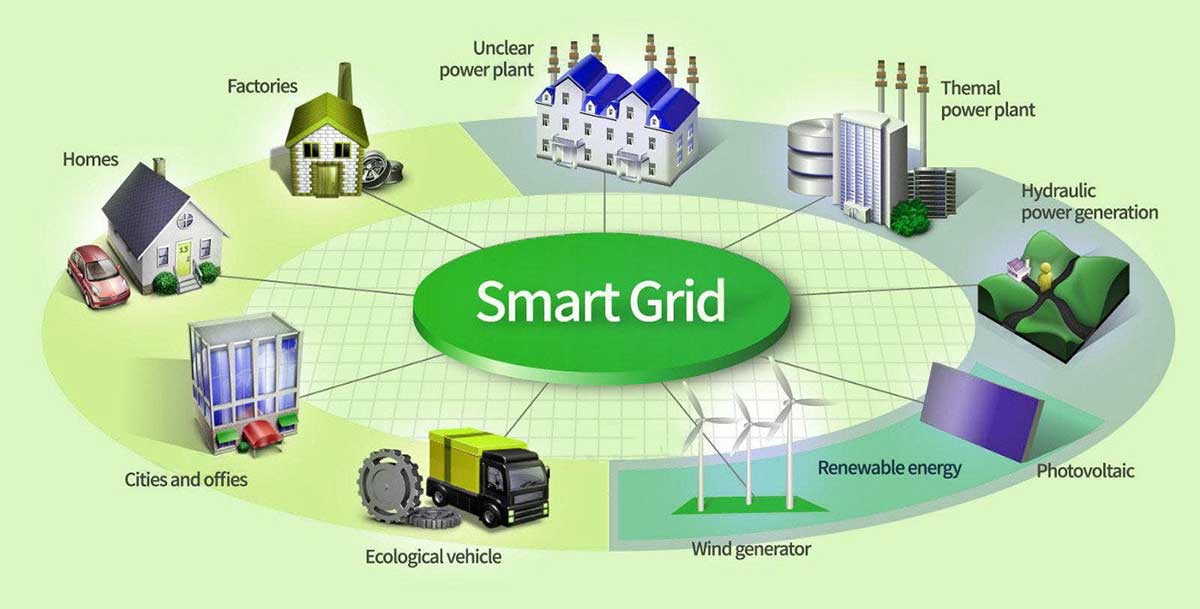Smart grid is a new type of grid based on advanced information, communication and control technologies, which deeply integrates traditional grid with modern information technology to realize intelligent, efficient, safe and environmentally friendly grid.
It can realize intelligent management and control of the whole process of power production, transmission, distribution and use, improve the operating efficiency and reliability of the power system, reduce energy consumption and carbon emissions, and provide strong support for the sustainable development of the economy and society.

As the global demand for energy continues to rise, conventional power grids face numerous challenges. These include inefficiencies in energy distribution, susceptibility to outages, and difficulties in integrating renewable energy sources. Consequently, there is a growing need for a more adaptable and resilient system. Smart grid solutions address these challenges by enabling real-time monitoring, enhancing the responsiveness of the grid, and facilitating the integration of distributed energy resources.
Transitioning from traditional power grids to smart grid solutions is not just about technology but also about creating a more sustainable future. With smart grids, energy providers can better manage supply and demand, reduce energy waste, and minimize carbon emissions. Additionally, smart grid technology empowers consumers by giving them more control over their energy usage, allowing for more informed decisions about energy consumption.
A comprehensive smart grid solution comprises several critical components, each playing a vital role in ensuring the grid’s efficiency and reliability. These components include:
1. Advanced Metering Infrastructure (AMI)
One of the core elements of any smart grid solution is the Advanced Metering Infrastructure (AMI). AMI systems enable two-way communication between energy providers and consumers, allowing for real-time data collection and analysis. This capability leads to more accurate billing, better demand response, and improved outage management.
2. Distribution Automation (DA)
Distribution Automation (DA) refers to the use of intelligent devices and sensors throughout the grid to monitor and control the distribution of electricity. These devices help in detecting faults, managing voltage levels, and rerouting power in case of failures. As a result, DA enhances the overall reliability of the grid and reduces downtime during outages.
3. Energy Management Systems (EMS)
Energy Management Systems (EMS) are central to the operation of smart grid solutions. These systems allow for the efficient coordination of generation, distribution, and consumption of electricity. By leveraging advanced algorithms and real-time data, EMS optimizes energy flow, reduces peak demand, and supports the integration of renewable energy sources.
4. Renewable Energy Integration
The ability to integrate renewable energy sources such as solar and wind is one of the most significant advantages of smart grid solutions. Traditional grids often struggle with the variability and intermittency of renewable energy. However, smart grid technology enables better forecasting, energy storage, and distribution, making it easier to incorporate these sustainable energy sources into the grid.
5. Cybersecurity Measures
As smart grid solutions rely heavily on digital communication and data exchange, ensuring the security of these systems is paramount. Robust cybersecurity measures are essential to protect the grid from cyber threats and ensure the integrity of data. This includes implementing encryption, intrusion detection systems, and regular security audits.
Implementing a smart grid solution offers numerous benefits for both energy providers and consumers. These advantages include:
1. Enhanced Grid Reliability
One of the most significant benefits of smart grid solutions is improved grid reliability. By leveraging real-time data and automation, smart grids can quickly detect and respond to faults, minimizing the impact of outages and ensuring a more stable power supply.
2. Increased Energy Efficiency
Smart grid technology enables more efficient energy distribution by optimizing the flow of electricity based on real-time demand. This leads to reduced energy losses, lower operational costs for utilities, and decreased energy consumption for consumers.
3. Better Demand Response
Demand response is a crucial feature of smart grid solutions, allowing energy providers to adjust the supply of electricity in response to changes in demand. This capability helps to prevent grid overloads, reduce peak demand, and lower electricity costs during high-demand periods.
4. Environmental Sustainability
By facilitating the integration of renewable energy sources and reducing energy waste, smart grid solutions contribute to a more sustainable energy future. This reduces the reliance on fossil fuels, decreases greenhouse gas emissions, and supports the transition to a low-carbon economy.
5. Empowered Consumers
With smart grid solutions, consumers gain more control over their energy usage through real-time data and advanced metering. This empowerment allows them to make more informed decisions about energy consumption, leading to cost savings and a reduced environmental footprint.
Informatization
Smart grid deeply integrates information technology with grid business to realize comprehensive perception, transmission, processing and application of grid data.
Automation
Smart grid realizes automatic control and intelligent dispatch of grid through automation technology and equipment, and improves the operation efficiency and stability of grid.
Interaction
Smart grid supports two-way interaction between users and grid, realizes effective management of power demand side, and improves the utilization efficiency of power resources.
Greening
Smart grid focuses on environmental protection and sustainable development, and reduces carbon emissions and pollutant emissions by optimizing energy structure and improving energy utilization efficiency.
In conclusion, smart grid solutions represent a transformative approach to modernizing the energy sector. By integrating advanced technologies, smart grids offer numerous benefits, including enhanced reliability, increased efficiency, and greater sustainability. While challenges exist, the continued development and adoption of smart grid solutions are essential for meeting the growing demand for energy and achieving a more sustainable future. As the energy landscape evolves, smart grid technology will remain at the forefront of innovation, driving the transition to a smarter, more resilient energy system.





